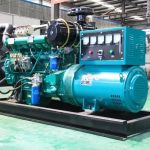Introduction
In today's modern world, electricity is an essential component of our daily lives. From powering our homes and businesses to running critical infrastructure such as hospitals and data centers, a reliable and stable supply of electricity is crucial. One of the key challenges in maintaining a stable electrical grid is voltage control. Fluctuations in voltage can lead to equipment damage, power outages, and inefficiencies in the electrical system. To address this issue, diesel generators are often used for voltage control. In this article, we will explore the role of diesel generators in voltage control, their advantages and disadvantages, and best practices for their implementation.
Overview of Diesel Generators
Diesel generators are a type of backup power system that uses a diesel engine to generate electricity. They are commonly used in applications where a reliable source of power is essential, such as hospitals, data centers, and industrial facilities. Diesel generators are known for their reliability, durability, and ability to provide high power output.
Diesel generators work by converting the chemical energy stored in diesel fuel into mechanical energy through combustion in the diesel engine. This mechanical energy is then converted into electrical energy through an alternator. The electricity generated by the diesel generator can be used to power electrical loads directly or be integrated into the electrical grid to provide voltage support.
Role of Diesel Generators in Voltage Control

One of the key roles of diesel generators in the electrical grid is voltage control. Voltage control is essential for maintaining the stability and reliability of the electrical system. Voltage fluctuations can lead to equipment damage, power quality issues, and disruptions in power supply. Diesel generators can help regulate voltage by providing reactive power support and voltage support during transient events.
Reactive power support is crucial for maintaining voltage stability in the electrical grid. Reactive power is required to regulate voltage levels and control the flow of electricity in the system. Diesel generators can provide reactive power support by injecting or absorbing reactive power as needed to maintain voltage within acceptable limits.
During transient events such as sudden changes in load or faults in the system, diesel generators can provide voltage support to stabilize the electrical grid. By quickly ramping up or down their power output, diesel generators can help mitigate voltage dips or surges and prevent equipment damage.
Advantages of Diesel Generators for Voltage Control
There are several advantages to using diesel generators for voltage control in the electrical grid:
1. Fast Response Time: Diesel generators have the ability to ramp up or down their power output quickly, making them ideal for providing voltage support during transient events.
2. High Power Output: Diesel generators are capable of providing high power output, making them suitable for applications where a large amount of power is required for voltage control.
3. Reliability: Diesel generators are known for their reliability and durability, ensuring continuous operation even in harsh conditions.
4. Fuel Efficiency: Diesel generators are more fuel-efficient compared to other types of generators, making them a cost-effective option for voltage control.
5. Versatility: Diesel generators can be used for a wide range of applications, from providing backup power to supporting voltage control in the electrical grid.
Disadvantages of Diesel Generators for Voltage Control
While diesel generators offer many advantages for voltage control, there are also some disadvantages to consider:
1. Environmental Impact: Diesel generators emit harmful pollutants such as nitrogen oxides and particulate matter, contributing to air pollution and environmental degradation.
2. Noise Pollution: Diesel generators can be noisy during operation, which may be a concern in residential areas or noise-sensitive environments.
3. Maintenance Requirements: Diesel generators require regular maintenance and servicing to ensure optimal performance, which can add to operational costs.
4. Fuel Storage: Diesel generators require on-site fuel storage, which can pose safety risks and additional logistical challenges.
Best Practices for Implementing Diesel Generators for Voltage Control
When implementing diesel generators for voltage control in the electrical grid, it is important to follow best practices to ensure optimal performance and reliability. Some key best practices include:
1. Sizing and Selection: Properly size and select the diesel generator based on the specific requirements of the electrical system, including power output, voltage regulation capabilities, and transient response.
2. 400kw generator : Integrate the diesel generator into the electrical grid using appropriate control systems and protection schemes to ensure seamless operation and coordination with other grid assets.
3. Maintenance: Establish a regular maintenance schedule for the diesel generator to inspect, test, and service critical components such as the engine, alternator, and fuel system to prevent breakdowns and ensure reliability.
4. Environmental Compliance: Comply with environmental regulations and emissions standards when operating diesel generators to minimize air pollution and environmental impact.
5. Monitoring and Control: Implement a monitoring and control system to track the performance of the diesel generator, monitor voltage levels, and respond to grid events in real-time to provide effective voltage control.
Conclusion
Diesel generators play a crucial role in voltage control in the electrical grid by providing reactive power support and voltage stabilization during transient events. While diesel generators offer many advantages such as fast response time, high power output, and reliability, there are also considerations such as environmental impact, noise pollution, and maintenance requirements to address. By following best practices for implementing diesel generators for voltage control, operators can ensure the efficient and effective operation of their electrical systems. Diesel generators will continue to be a vital asset in maintaining a stable and reliable electrical grid for years to come.
